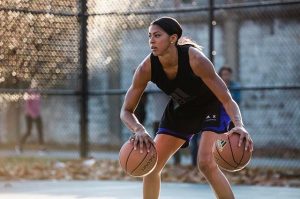In basketball, physical conditioning and skill development are essential, but nutrition often plays an underestimated role in peak performance. Whether you’re sprinting up and down the court, jumping for rebounds, or shooting the game-winning basket, your body needs the right fuel to perform at its best. In this blog, we’ll explore how proper nutrition is key to basketball success and provide guidance on what to eat to maximize energy, endurance, and recovery.
Why Nutrition Matters in Basketball
Basketball is a fast-paced sport that demands a combination of speed, strength, agility, and endurance. Proper nutrition supports these physical demands by providing the necessary energy for performance and promoting recovery after strenuous games and practices.
Here’s how nutrition can impact your performance:
- Energy Production
Carbohydrates are your body’s primary energy source. Eating the right amount of carbs ensures you have enough fuel to keep your intensity high throughout the game. - Muscle Recovery
Protein helps repair and build muscles. Basketball players constantly push their muscles to the limit, so protein intake is vital for recovery and preventing injury. - Hydration
Staying hydrated is crucial for maintaining stamina and focus. Dehydration can lead to fatigue, cramping, and a decline in performance. - Mental Focus
The brain needs consistent energy from food to stay sharp. Balanced meals help maintain focus and decision-making ability on the court.

Macronutrients for Basketball Players
To fuel your body for peak performance, it’s important to understand the role of the three macronutrients: carbohydrates, proteins, and fats. Each plays a specific role in basketball performance.
1. Carbohydrates: The Primary Fuel Source
Carbohydrates are the main source of energy for high-intensity activities like basketball. They provide quick energy that your body can access during fast breaks, sprints, and long practices.
- Examples of Good Carbohydrates: Whole grains (brown rice, quinoa, oats), fruits, vegetables, and legumes.
- When to Eat Carbs: Focus on consuming complex carbohydrates several hours before a game to provide long-lasting energy. Simple carbs, such as fruits or energy bars, are great for quick energy closer to game time.
2. Proteins: Building and Repairing Muscle
Protein is essential for muscle growth and recovery. After a tough game or workout, your muscles need to repair and rebuild, which requires adequate protein intake.
- Examples of Good Proteins: Lean meats (chicken, turkey), fish, eggs, dairy products, legumes, and plant-based protein sources.
- When to Eat Protein: Include protein in every meal and especially after games or training sessions to aid in muscle recovery.
3. Fats: Sustained Energy and Brain Function
Fats are an important energy source, especially for longer-lasting fuel. They also support brain function, which is critical for making quick decisions on the court.
- Examples of Healthy Fats: Avocados, nuts, seeds, olive oil, and fatty fish like salmon.
- When to Eat Fats: Include healthy fats in your diet to support overall health and provide sustained energy throughout the day. Avoid heavy fats right before a game as they can slow digestion.

Pre-Game Nutrition: What to Eat Before the Game
What you eat before a game can significantly affect your performance. The goal is to fuel your body with easily digestible foods that provide lasting energy and prevent fatigue.
- Timing
Aim to eat a balanced meal 3-4 hours before the game. This meal should include a combination of complex carbohydrates, lean protein, and healthy fats. If you need a snack closer to game time, eat something light and easy to digest, like fruit or an energy bar, about 30-60 minutes before tip-off. - Pre-Game Meal Ideas
- Grilled chicken with brown rice and vegetables
- Whole grain pasta with lean meat sauce
- Oatmeal with fruit and nuts
- A turkey and avocado sandwich on whole grain bread
- Pre-Game Snacks
- A banana or apple with peanut butter
- Greek yogurt with berries
- A handful of mixed nuts and dried fruit
- A small protein shake
Post-Game Nutrition: Recovery and Replenishment
After a game, your body needs to recover, rebuild muscles, and replenish glycogen (the stored form of carbohydrate) in your muscles. What you eat post-game can help speed up recovery and prepare you for your next workout or game.
- Timing
Eating within 30-60 minutes after the game is crucial for recovery. Your body is in a prime state to absorb nutrients during this window, which accelerates muscle repair and glycogen replenishment. - Post-Game Meal Ideas
- Grilled salmon with quinoa and steamed vegetables
- A turkey and avocado wrap with a side of fruit
- A protein smoothie with Greek yogurt, spinach, and berries
- Stir-fried tofu with brown rice and vegetables
- Post-Game Snacks
- Chocolate milk (a great mix of carbs and protein)
- Cottage cheese with pineapple
- A protein bar with a side of fruit
- A boiled egg and whole grain toast
Hydration: Staying Hydrated on the Court
Staying hydrated is critical for maintaining peak performance during a game. Dehydration can lead to fatigue, decreased focus, and muscle cramps, which will negatively affect your performance.
- How Much to Drink
- Before the Game: Start hydrating the day before and drink 16-20 ounces of water 2-3 hours before tip-off.
- During the Game: Aim to drink 7-10 ounces of water or a sports drink every 10-20 minutes during the game to maintain electrolyte balance and hydration levels.
- After the Game: Replenish lost fluids by drinking 16-24 ounces of water or a recovery drink for every pound lost during the game.
- Electrolytes
In intense games, you lose not only water but also electrolytes like sodium and potassium through sweat. Sports drinks can help replenish electrolytes, especially during long games or if you’re sweating heavily.

Supplements for Basketball Players: Are They Necessary?
While a balanced diet should provide most of the nutrients your body needs, some athletes turn to supplements for an extra boost. Common supplements used by basketball players include protein powder, creatine, and multivitamins. Always consult with a healthcare provider before introducing any supplements into your routine.
- Protein Powder: Helpful for post-game recovery when you don’t have access to a full meal.
- Creatine: Can support strength and endurance, especially for high-intensity movements.
- Multivitamins: Ensure you’re getting all the essential vitamins and minerals needed for overall health.
Conclusion
Nutrition is the unsung hero of basketball performance. From fueling your body before a game to aiding in recovery afterward, what you eat can have a huge impact on your endurance, strength, and overall game. By focusing on a balanced diet rich in carbohydrates, proteins, and healthy fats, as well as staying properly hydrated, you can ensure that your body performs at its peak. Remember, great players don’t just train hard—they fuel smart.
